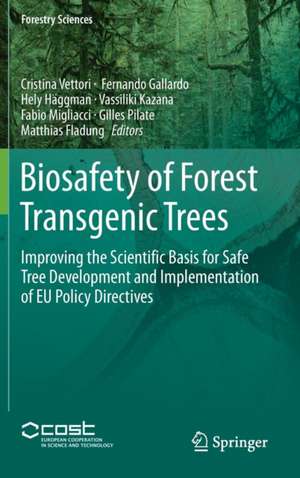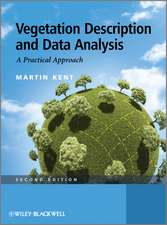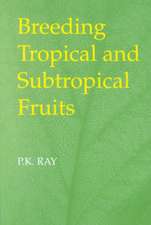Biosafety of Forest Transgenic Trees: Improving the Scientific Basis for Safe Tree Development and Implementation of EU Policy Directives: Forestry Sciences, cartea 82
Editat de Cristina Vettori, Fernando Gallardo, Hely Häggman, Vassiliki Kazana, Fabio Migliacci, Gilles Pilate, Matthias Fladungen Limba Engleză Hardback – 2 mar 2016
| Toate formatele și edițiile | Preț | Express |
|---|---|---|
| Paperback (1) | 947.35 lei 43-57 zile | |
| SPRINGER NETHERLANDS – 7 apr 2018 | 947.35 lei 43-57 zile | |
| Hardback (1) | 953.35 lei 43-57 zile | |
| SPRINGER NETHERLANDS – 2 mar 2016 | 953.35 lei 43-57 zile |
Din seria Forestry Sciences
- 18%
 Preț: 958.56 lei
Preț: 958.56 lei -
 Preț: 388.13 lei
Preț: 388.13 lei - 15%
 Preț: 644.18 lei
Preț: 644.18 lei - 18%
 Preț: 1848.16 lei
Preț: 1848.16 lei - 18%
 Preț: 2105.44 lei
Preț: 2105.44 lei -
 Preț: 390.25 lei
Preț: 390.25 lei - 18%
 Preț: 950.33 lei
Preț: 950.33 lei -
 Preț: 390.84 lei
Preț: 390.84 lei - 18%
 Preț: 1226.73 lei
Preț: 1226.73 lei -
 Preț: 383.50 lei
Preț: 383.50 lei - 18%
 Preț: 950.33 lei
Preț: 950.33 lei - 18%
 Preț: 1234.77 lei
Preț: 1234.77 lei - 15%
 Preț: 637.28 lei
Preț: 637.28 lei -
 Preț: 387.58 lei
Preț: 387.58 lei -
 Preț: 385.62 lei
Preț: 385.62 lei - 18%
 Preț: 952.72 lei
Preț: 952.72 lei - 18%
 Preț: 1219.63 lei
Preț: 1219.63 lei - 18%
 Preț: 1229.73 lei
Preț: 1229.73 lei - 15%
 Preț: 647.59 lei
Preț: 647.59 lei - 18%
 Preț: 949.73 lei
Preț: 949.73 lei - 18%
 Preț: 946.10 lei
Preț: 946.10 lei - 18%
 Preț: 2762.55 lei
Preț: 2762.55 lei - 15%
 Preț: 644.95 lei
Preț: 644.95 lei - 18%
 Preț: 1840.26 lei
Preț: 1840.26 lei - 18%
 Preț: 1228.15 lei
Preț: 1228.15 lei - 18%
 Preț: 1236.69 lei
Preț: 1236.69 lei - 15%
 Preț: 639.73 lei
Preț: 639.73 lei - 18%
 Preț: 1847.21 lei
Preț: 1847.21 lei
Preț: 953.35 lei
Preț vechi: 1162.61 lei
-18% Nou
Puncte Express: 1430
Preț estimativ în valută:
182.48€ • 198.28$ • 153.38£
182.48€ • 198.28$ • 153.38£
Carte tipărită la comandă
Livrare economică 21 aprilie-05 mai
Preluare comenzi: 021 569.72.76
Specificații
ISBN-13: 9789401775298
ISBN-10: 940177529X
Pagini: 337
Ilustrații: XVII, 337 p. 40 illus., 33 illus. in color.
Dimensiuni: 155 x 235 x 21 mm
Greutate: 0.67 kg
Ediția:1st ed. 2016
Editura: SPRINGER NETHERLANDS
Colecția Springer
Seria Forestry Sciences
Locul publicării:Dordrecht, Netherlands
ISBN-10: 940177529X
Pagini: 337
Ilustrații: XVII, 337 p. 40 illus., 33 illus. in color.
Dimensiuni: 155 x 235 x 21 mm
Greutate: 0.67 kg
Ediția:1st ed. 2016
Editura: SPRINGER NETHERLANDS
Colecția Springer
Seria Forestry Sciences
Locul publicării:Dordrecht, Netherlands
Public țintă
ResearchCuprins
Introduction.- Genetic engineering – contribution to forest tree breeding efforts.- New transformation technologies for trees.- Lessons from 25 years of GM tree field trials in Europe and prospects for the future.- Lessons from two decades of field trials with genetically modified trees in the USA: Biology and regulatory compliance.- Specific environmental considerations for GM trees and guidance on their risk assessment and monitoring.- Field trials with GM trees: A step-by-step approach.- Soil effects of genetically-modified trees (GMTs).- Potential Environmental Impact of Insect-Resistant Transgenic Trees.- Potential impacts of GM trees on the environment and on plant “omics”: questionnaire-based responses.- Approaches and tools for a socio-economic assessment of GM forest tree crops: Factors for consideration in Cost-Benefit Analyses.- Public knowledge and perceptions of safety issues towards the use of genetically modified forest trees: A cross-country pilot survey.- A COMPARATIVEANALYSIS OF CONSUMERS’ POTENTIAL PURCHASING BEHAVIOUR TOWARDS TRANSGENIC DERIVED FOREST PRODUCTS: THE GREEK CASE.- Socio-economic considerations for decision making on GM tree cultivation.- Value communication in the field of agri-food.- The COST Action FP0905 experience on the Web: Web 2.0 and scientific dissemination.
Textul de pe ultima copertă
This book provides up-to-date information on the environmental impact of transgenic trees on genetically modified tree (GMT) communication strategy. It is useful to public/private organisations as well as to private and public research bodies and universities worldwide since it reports on the global status of GMT research and policy. A high number of genetically modified trees (GMTs) with altered or novel characteristics have been produced in the last 15 years. However, their very low public acceptance is a basic problem in their commercialization. Breeders anticipate economic and ecological benefits, like reduced product costs and less pressure on native forests, while opponents fear risks, such as unintended spread of GMTs. But what is true? To answer this question, the COST Action FP0905 focused on key aspects related to GMTs: (a) biological characterization; (b) assessment of possible environmental impacts; (c) socio-economic implications and public acceptance/concerns; (d) providing science-based information to communicate with the public.
Caracteristici
Provides up-to-date information on transgenic trees’ Environmental impact on genetically modified (GM) tree Communication strategy in relation to genetically modified (GM) tree Includes supplementary material: sn.pub/extras






